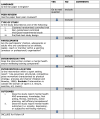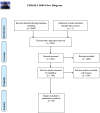An updated systematic review of interventions to increase awareness of mental health and well-being in athletes, coaches, officials and parents
- PMID: 35590425
- PMCID: PMC9118780
- DOI: 10.1186/s13643-022-01932-5
An updated systematic review of interventions to increase awareness of mental health and well-being in athletes, coaches, officials and parents
Abstract
Background: Interventions designed to increase mental health awareness in sport have grown substantially in the last 5 years, meaning that those involved in policy, research and intervention implementation are not fully informed by the latest systematic evaluation of research, risking a disservice to healthcare consumers. Hence, our aim was to update a 2017 systematic review that determined the effect of sport-specific mental health awareness programmes to improve mental health knowledge and help-seeking among sports coaches, athletes and officials. We extended the review to incorporate parents as a source of help-seeking and report the validity of outcome measures and quality of research design that occurred since the original review.
Methods: Sport-specific mental health awareness programmes adopting an experimental or quasi-experimental design were included for synthesis. Five electronic databases were searched: Psychinfo, Medline (OVID interface), Scopus, Cochrane and Cinahl. Each database was searched from its year of inception to June 2020. As all of the outcomes measured were derived from psychometric scales, we observed statistically significant quantitative effects on the basis of p < .05, and a small, medium or large effect size as d = .2, .5 or .8, respectively. Risk of bias was assessed using the Cochrane and QATSQ tools.
Results: Twenty-eight articles were included from the 2048 retrieved, eighteen additional articles since the original review. Eighteen studies targeted athletes, five with coaches, one sport officials (i.e. referees), one 'at-risk children' and three with parents. One of the studies was a combination of athletes, coaches and parents. In terms of study outcomes, health referral efficacy was improved in seven studies; twelve studies reported an increase in knowledge about mental health disorders. Proportionally, higher quality research designs were evident, as three of ten studies within the previous review did not demonstrate a high risk of bias, whereas thirteen of the eighteen additional studies did not display a high risk of bias. However, only one study included a behaviour change model in both the programme design and evaluation.
Conclusions: Our updated systematic review provides evidence of the benefits of mental health awareness interventions in sport; these benefits are mainly for athletes and show improvements in the methodological design of recent studies compared to the first review. There was also evidence of the extension of programme delivery to parents. In conclusion, researchers, practitioners and policy makers should consider methodological guidance and the application of theory when developing and evaluating complex interventions.
Systematic review registration: PROSPERO CRD42016040178.
Keywords: Athletes; Health promotion; Interventions; Mental health literacy; Resilience; Sport.
© 2022. The Author(s).
Conflict of interest statement
The authors declare that they have no competing interests.
Figures
References
-
- Gorczynski P, Webb T. Managing sport and leisure. 2020. Call-to-action: the need for a mental health research agenda for sports match officials; pp. 1–5.
-
- Carson F, Walsh J, Main LC, Kremer P. High performance coaches’ mental health and wellbeing: applying the areas of work life model. Int Sport Coach J. 2018;5(3):293. doi: 10.1123/iscj.2017-0078. - DOI
Publication types
MeSH terms
LinkOut - more resources
Full Text Sources
Medical
Research Materials



